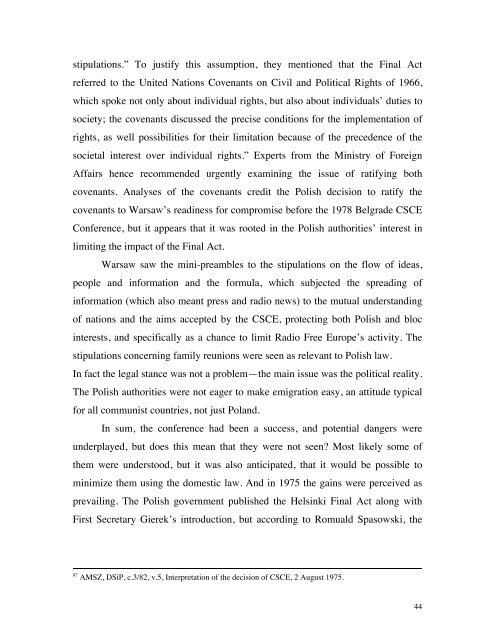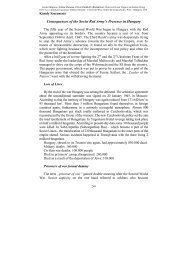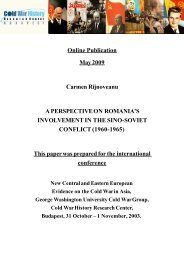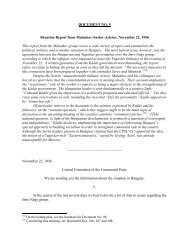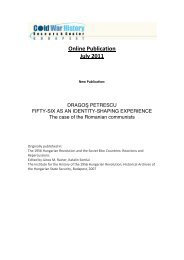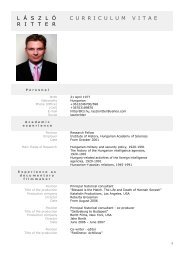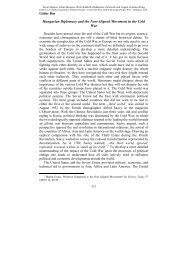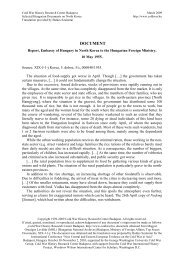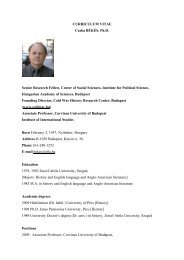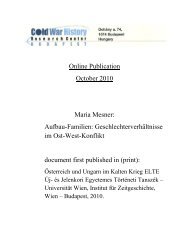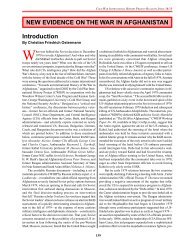Hope and Reality: Poland and the Conference on Security and ...
Hope and Reality: Poland and the Conference on Security and ...
Hope and Reality: Poland and the Conference on Security and ...
Create successful ePaper yourself
Turn your PDF publications into a flip-book with our unique Google optimized e-Paper software.
stipulati<strong>on</strong>s.” To justify this assumpti<strong>on</strong>, <str<strong>on</strong>g>the</str<strong>on</strong>g>y menti<strong>on</strong>ed that <str<strong>on</strong>g>the</str<strong>on</strong>g> Final Actreferred to <str<strong>on</strong>g>the</str<strong>on</strong>g> United Nati<strong>on</strong>s Covenants <strong>on</strong> Civil <str<strong>on</strong>g>and</str<strong>on</strong>g> Political Rights of 1966,which spoke not <strong>on</strong>ly about individual rights, but also about individuals’ duties tosociety; <str<strong>on</strong>g>the</str<strong>on</strong>g> covenants discussed <str<strong>on</strong>g>the</str<strong>on</strong>g> precise c<strong>on</strong>diti<strong>on</strong>s for <str<strong>on</strong>g>the</str<strong>on</strong>g> implementati<strong>on</strong> ofrights, as well possibilities for <str<strong>on</strong>g>the</str<strong>on</strong>g>ir limitati<strong>on</strong> because of <str<strong>on</strong>g>the</str<strong>on</strong>g> precedence of <str<strong>on</strong>g>the</str<strong>on</strong>g>societal interest over individual rights.” Experts from <str<strong>on</strong>g>the</str<strong>on</strong>g> Ministry of ForeignAffairs hence recommended urgently examining <str<strong>on</strong>g>the</str<strong>on</strong>g> issue of ratifying bothcovenants. Analyses of <str<strong>on</strong>g>the</str<strong>on</strong>g> covenants credit <str<strong>on</strong>g>the</str<strong>on</strong>g> Polish decisi<strong>on</strong> to ratify <str<strong>on</strong>g>the</str<strong>on</strong>g>covenants to Warsaw’s readiness for compromise before <str<strong>on</strong>g>the</str<strong>on</strong>g> 1978 Belgrade CSCE<str<strong>on</strong>g>C<strong>on</strong>ference</str<strong>on</strong>g>, but it appears that it was rooted in <str<strong>on</strong>g>the</str<strong>on</strong>g> Polish authorities’ interest inlimiting <str<strong>on</strong>g>the</str<strong>on</strong>g> impact of <str<strong>on</strong>g>the</str<strong>on</strong>g> Final Act.Warsaw saw <str<strong>on</strong>g>the</str<strong>on</strong>g> mini-preambles to <str<strong>on</strong>g>the</str<strong>on</strong>g> stipulati<strong>on</strong>s <strong>on</strong> <str<strong>on</strong>g>the</str<strong>on</strong>g> flow of ideas,people <str<strong>on</strong>g>and</str<strong>on</strong>g> informati<strong>on</strong> <str<strong>on</strong>g>and</str<strong>on</strong>g> <str<strong>on</strong>g>the</str<strong>on</strong>g> formula, which subjected <str<strong>on</strong>g>the</str<strong>on</strong>g> spreading ofinformati<strong>on</strong> (which also meant press <str<strong>on</strong>g>and</str<strong>on</strong>g> radio news) to <str<strong>on</strong>g>the</str<strong>on</strong>g> mutual underst<str<strong>on</strong>g>and</str<strong>on</strong>g>ingof nati<strong>on</strong>s <str<strong>on</strong>g>and</str<strong>on</strong>g> <str<strong>on</strong>g>the</str<strong>on</strong>g> aims accepted by <str<strong>on</strong>g>the</str<strong>on</strong>g> CSCE, protecting both Polish <str<strong>on</strong>g>and</str<strong>on</strong>g> blocinterests, <str<strong>on</strong>g>and</str<strong>on</strong>g> specifically as a chance to limit Radio Free Europe’s activity. Thestipulati<strong>on</strong>s c<strong>on</strong>cerning family reuni<strong>on</strong>s were seen as relevant to Polish law.In fact <str<strong>on</strong>g>the</str<strong>on</strong>g> legal stance was not a problem—<str<strong>on</strong>g>the</str<strong>on</strong>g> main issue was <str<strong>on</strong>g>the</str<strong>on</strong>g> political reality.The Polish authorities were not eager to make emigrati<strong>on</strong> easy, an attitude typicalfor all communist countries, not just Pol<str<strong>on</strong>g>and</str<strong>on</strong>g>.In sum, <str<strong>on</strong>g>the</str<strong>on</strong>g> c<strong>on</strong>ference had been a success, <str<strong>on</strong>g>and</str<strong>on</strong>g> potential dangers wereunderplayed, but does this mean that <str<strong>on</strong>g>the</str<strong>on</strong>g>y were not seen? Most likely some of<str<strong>on</strong>g>the</str<strong>on</strong>g>m were understood, but it was also anticipated, that it would be possible tominimize <str<strong>on</strong>g>the</str<strong>on</strong>g>m using <str<strong>on</strong>g>the</str<strong>on</strong>g> domestic law. And in 1975 <str<strong>on</strong>g>the</str<strong>on</strong>g> gains were perceived asprevailing. The Polish government published <str<strong>on</strong>g>the</str<strong>on</strong>g> Helsinki Final Act al<strong>on</strong>g withFirst Secretary Gierek’s introducti<strong>on</strong>, but according to Romuald Spasowski, <str<strong>on</strong>g>the</str<strong>on</strong>g>87 AMSZ, DSiP, c.3/82, v.5, Interpretati<strong>on</strong> of <str<strong>on</strong>g>the</str<strong>on</strong>g> decisi<strong>on</strong> of CSCE, 2 August 1975.44


